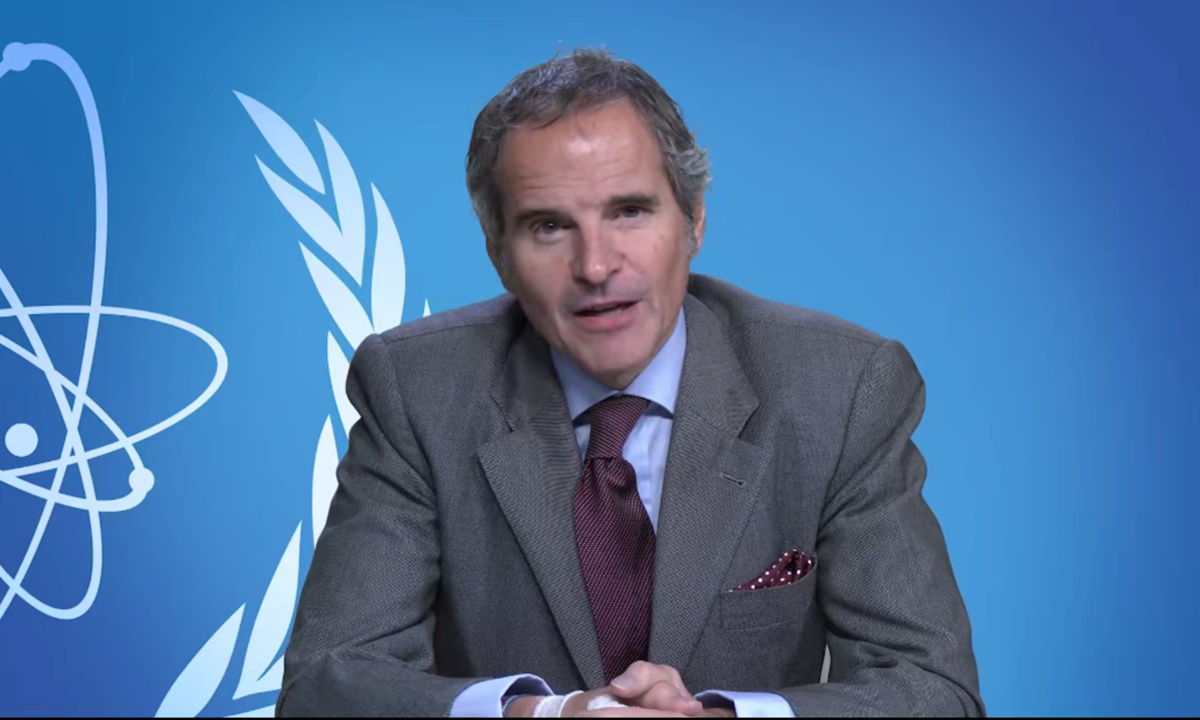IAEA director general hails China's nuclear energy efforts to combat climate change

International Atomic Energy Agency (IAEA) Director General Rafael Grossi delivers a video speech at the China Nuclear Energy Sustainable Development Forum. Photo: screenshot of the video speech
International Atomic Energy Agency (IAEA) Director General Rafael Grossi delivered a video speech on Wednesday, emphasizing the need for clean and affordable sustainable energy to combat the most severe climate change. Grossi hailed China's efforts to achieve peak carbon dioxide emissions before 2030 and carbon neutrality by 2060, noting that as the world's largest energy consumer, China has made significant strides in low-carbon development, including the active and orderly development of nuclear energy.
Grossi made the remarks at the China Nuclear Energy Sustainable Development Forum which is being held in Beijing from Wednesday to Friday. The theme of the forum is the High-quality development of nuclear energy in the context of carbon peak and neutralization target.
According to Grossi, nuclear energy is a crucial component of China's plan to reduce green house gas emissions, improve energy accessibility and security, and stabilize international energy market prices. Nuclear energy can be deployed on a large scale to achieve these goals.
Grossi said that he has visited over 30 countries with nuclear projects, and more than 20 countries are implementing nuclear projects. The prospects for nuclear energy development are clear, but decision-making bodies must lay the groundwork for investment in nuclear energy. Public acceptance of nuclear energy is also increasing, according to public opinion polls.
To achieve climate goals by 2050, global nuclear capacity must double, meaning existing nuclear power plants must continue to operate and even extend their lifetimes, while new reactors must be continuously commissioned.
China has over 30 years of nuclear power development history since the first nuclear power unit was connected to the grid. China currently has 55 operating nuclear power units, ranking first in the world in terms of units under construction. To achieve near-term and long-term climate goals, China has expanded the application of nuclear energy beyond power generation, such as using nuclear energy for regional heating and launching the first industrial heating project.
The IAEA's "Net Zero Emissions" initiative hopes to plan future energy development in each country to fully tap the potential of nuclear energy. China's rapid nuclear energy growth, mature technology, and cooperation with multiple nuclear power countries will continue to increase the relevance of international cooperation in the coming years.
The nuclear energy industry is becoming increasingly international, especially with the development of small modular reactors (SMRs). There are over 80 SMR designs globally, with three already commissioned and many more under construction, Grossi said.
China has developed the high-temperature gas-cooled reactor "Linglong One." For many countries, building large reactors is not practical or economical, so many countries are considering building SMRs. Grossi is pushing for the standardization of design and regulatory coordination of SMRs through the IAEA.
China has gained a lot of experience and feedback in international nuclear energy cooperation, especially in the construction of nuclear power plants, as well as the norms and regulations related to nuclear safety and security. These aspects require more standardization and coordination, and the IAEA is working closely with China on these issues, he said.
The IAEA and China have completed several peer review projects together, and China's nuclear safety review mechanism has attracted representatives from more than 50 countries to participate in discussions. Nuclear safety and security are essential for people's well-being and sustainable nuclear energy development. Chinese nuclear safety experts are sharing their experiences with international peers through the IAEA's capacity-building projects.
The IAEA and China are continuing their longest-running cooperation project on the management of nuclear waste and radioactive waste, helping to build advanced underground nuclear waste treatment laboratories in China, Grossi said.
Global Times


